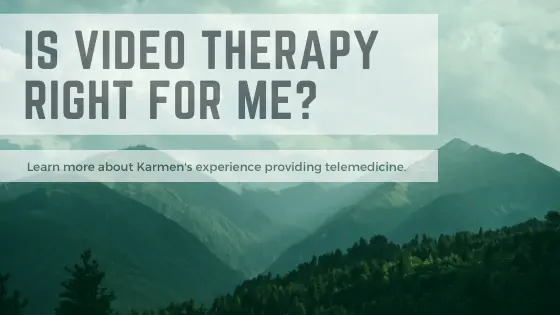Telemedicine, or seeing a medical professional on live video via the internet, is spreading across all parts of medical care including mental health. Referred to as video therapy, telehealth, and offered via various applications there are a lot of reasons you might consider having a virtual session. If you live in a small town it may be a way to access a provider who has a specialty or approach that isn’t available. If you find it hard to work therapy into your schedule, cutting out the commute may remove that barrier. Or if you don’t have childcare for therapy you may be able to keep your kid more easily occupied at home with their toys than you could in the therapy office. Here are a few things to note if you’re considering visiting a mental health professional online.
As a new practitioner of video therapy, I was pleasantly surprised to find that the process of therapy feels much the same as it does in a typical therapy room. As long as I can see your face and hear you, I have what I need to do my job best. I have found that video therapy is just as productive as traditional in-person therapy. While I initially thought this was only the case with clients I had worked with in-person, I have now also started therapy relationships via video only with good effect. As the session begins and we do a quick “can you see me and hear me just fine?” I find it is easy to quickly settle into the therapy groove – how are you, what’s new, and how are the things we’ve been working on – and then the session takes off just like it does in person. The distance and technology seems to melt away because we are still technically (pun intended) face-to-face.
Things to consider and clarify with your therapist:
Technology: You will need a smartphone or computer with a camera and microphone, internet connection, and a quiet and decently lit location. All smartphones and most laptops now have the camera and microphone incorporated, but if not you get a web camera and microphone/headphone set both easily and cheaply.
Competency: You’ll want to make sure your therapist holds a mental health license in the state where you are a resident and the platform they use for therapy is encrypted to protect your confidentiality.
Location: Important to note that even though we offer remote and it is becoming more common, doctors and therapists are licensed in specific states and are not able to offer remote services out of the state they hold their license in. All of our clinicians are licensed here in Colorado and can only serve clients who reside in Colorado. We are a good option for clients who live in mountain towns or busy professionals!




